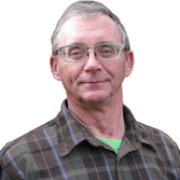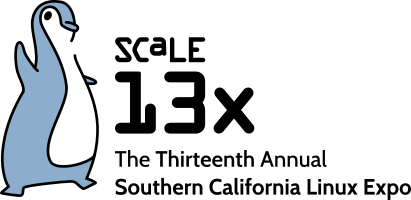
Long-time Free/Open Source Software participant Charlie Kravetz, the former project lead for Xubuntu, makes his SCALE speaking debut at SCALE 13x. Charlie will be giving a talk on Accessibility in Software on SCALE 13x Saturday at 3. The SCALE Team caught up with Charlie to ask him about accessibility issues.
Q: Could you please introduce yourself and tell us a little about your background?
A: I am Charlie Kravetz. I started using Ubuntu in 2005, with the first public release. I had been using public domain software for a while already. I spent 18 months as project lead for Xubuntu, as the first non-developer in that position. I also volunteered as head of Quality Assurance for Xubuntu prior to that.
As for my experience with accessibility, I was diagnosed with multiple sclerosis in 2000. Prior to that, I lost my eyesight for over six months in 1995. My vision was 2/1200ths, corrected. I could not see anything. Since my diagnosis, I have lost the use of my legs, lost use of the right arm and hand for over a year, lost use of the left hand for two years, and had great difficulty with speech for a couple of years. Fortunately, most of those were not at the same time.
Q: You're giving a talk on Accessibility in Software. Without tipping your hand on the actual talk, can you give us an idea of what we might expect?
A: I am hoping to teach developers and companies about the difficulties of finding suitable software for the disabled. Having the challenges I have had, I have considerable with hardware and software that is designed for the disabled. I have spoken to several other people, and discovered that the problems I faced are widespread, and not necessarily limited to any operating system.
Q: Is this your first visit to SCALE? If so, what are your expectations? If not, can you give us your impressions of the event?
A: This is my first visit to SCALE. I am hoping to simply educate a few people on the challenges of accessible software. I would also hope for the chance to educate users on what is actually available, before they find they have to have it. I am looking forward to SCALE, and the opportunity to meet some of those I admire in open source. I have very high respect for the developers that allow those of us not so talented the opportunity to use what they have worked so hard on.
Q: You stated you believe that accessibility software is difficult to use. Why do you think that way?
A: Due to my many challenges in life, I have discovered that many times, we do not consider the issues of getting to that accessibility software until we become disabled. Most able bodied individuals can not test the software, or do not know how to test it. An example I sometimes use is to ask the individual "if you lost your eyesight tomorrow, could you continue to use your computer?". Very few can say yes. Most will require someone to turn the unit on, search for the needed software, install it, then attempt to teach the blind individual how to use it. It is not an easy process.
Q: Is there anything else you'd like to add?
A: Many of us in the disabled community are extremely determined to do what we want, by ourselves, at the expense of time. That determination is what drives us to do what we do, and often gets me through the day. Thank you for allowing me to do this presentation at SCALE. If I can teach even one person how critical accessibility is for some of us, I will consider it very successful.
[SCALE Team Interview by Larry Cafiero]


